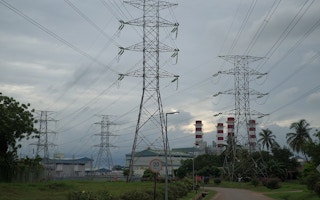Liberalising the power sector completely to meet the increasing energy demand in Malaysia and achieve national net zero targets can lead to market manipulation, a regulator has warned.
To continue reading, subscribe to Eco‑Business.
There's something for everyone. We offer a range of subscription plans.
- Access our stories and receive our Insights Weekly newsletter with the free EB Member plan.
- Unlock unlimited access to our content and archive with EB Circle.
- Publish your content with EB Premium.
Such a move may not be ideal for the local energy sector for the time being due to the complexity of dealing with multiple parties in integrated electricity planning.
Sanjayan Velautham, chief operating officer of Malaysia’s Energy Commission, the key statutory board regulating Peninsular Malaysia’s electricity and piped gas supply, said examples from developed energy markets show that total liberalisation has resulted in market manipulation where players control the market in terms of supply and pricing.
Speaking at a sustainability event in Kuala Lumpur last month, he said that while the government has learnt that the energy transition demands a diversified and flexible approach, moving aggressively into free competition could affect the reliability of Malaysia’s electricity supply or lead to higher costs.
“It should not be a one-size-fits-all approach,” he said, in reference to resolving Malaysia’s energy trilemma – of energy security, affordability and sustainability – and taking lessons from developed markets. While liberalisation introduces competition, regulators need to make sure it brings about good outcomes such as a reduction in cost and more choices for the consumers, he added.
Malaysia’s energy sector operates with centralised utility systems that are being controlled by single entities. End users source their electricity, including that from conventional sources, from Tenaga Nasional Bhd (TNB), Malaysia’s largest utility and the sole operator of the national grid.
Power generation was opened to private sector players in the 1990s with the introduction of independent power producers (IPPs), which were allowed to inject electricity directly into the national grid.
With the introduction of the Corporate Renewable Energy Supply Scheme (CRESS) in September last year by the Ministry of Energy Transition and Water Transformation (PETRA), third parties can now sell or purchase electricity through an open access grid system, though TNB still holds full control over the transmission and distribution networks in Peninsular Malaysia.
At an Eco-Business event in August last year, environmental sustainability minister Nik Nazmi Nik Ahmad signalled that there is government will to ultimately shift away from a regime in which TNB has near monopoly on energy distribution. Some market players have also been pushing for further liberalisation of the electricity market.
There is increasing enthusiasm from the industry to participate in CRESS, with existing players also expressing interest to trade and procure clean energy under the initiative – which isn’t yet allowed, shared PETRA deputy minister Akmal Nasrullah Mohd Nasir last week.
Currently, CRESS primarily caters to new renewable energy generators connected to the high-voltage grid and new commercial and industrial electricity users under TNB Retail, the utility’s wholly-owned subsidiary.
For existing customers who signed energy supply agreements before the scheme kicked in, they can only join the scheme with a request for an additional load above 100 megawatts of electricity, which will be the final load of their current supply contracts, as advised by the Energy Commission.
At the Forum Ekonomi Malaysia organised by the government, Akmal said the response is a positive signal for the authorities to look into realising the potential for more renewable energy coming into the system.
Energy premium for data centres
With Malaysia set for a surge in energy-intensive data centre operations by 2025, there is a greater push to further liberalise the renewable energy market, enabling greater participation from additional players in the system.
Sanjayan acknowledged the growing demand, and also cautioned that a complete liberalisation of the energy sector will bring in “complexity” – that regulators must be ready for. Managing a single entity would mean it is easier to impose controls, he said.
He stressed the need for improved self-regulation within a liberalised market framework to ensure stability and prevent market manipulation.
“If we move too cautiously, we might miss critical investments, like the data centres that are coming in. We want these investments, but we also need to understand their long-term supply-side impacts,” he said, adding that balancing liberalisation with regulatory oversight would be key to addressing current challenges in the energy sector.
He also pointed out that Malaysia’s journey over the past 25 years in upgrading its energy infrastructure offers valuable insights. While learning from advanced economies like the United Kingdom, United States and Australia is important, solutions must also account for Malaysia’s unique circumstances, he stressed.
Malaysia’s power sector accounts for about 80 per cent of the country’s total greenhouse gas emissions. As part of its commitment to achieving net zero by 2050, the government has identified that decarbonising the energy sector through a renewable energy push is critical.
The country has emerged as a global hotspot for data centres, storage facilities that enable fast-growing technologies such as artificial intelligence and cloud computing. It has attracted more than US$16 billion in investment commitments over the past year from Amazon, Nvidia, Google, Microsoft and TikTok owner ByteDance, most of it for development projects in the southern state of Johor, which borders Singapore.
In an interview with the Financial Times published last Sunday, Nik Nazmi said that the government was becoming “more selective” after the recent data centre boom put a lot of pressure on Malaysia’s water and energy resources, though he describes data as the “new oil of the 21st century” and a movement that the country wants to be part of. Technology players running such operations would be expected to pay a premium for access to energy supplies, he said.








